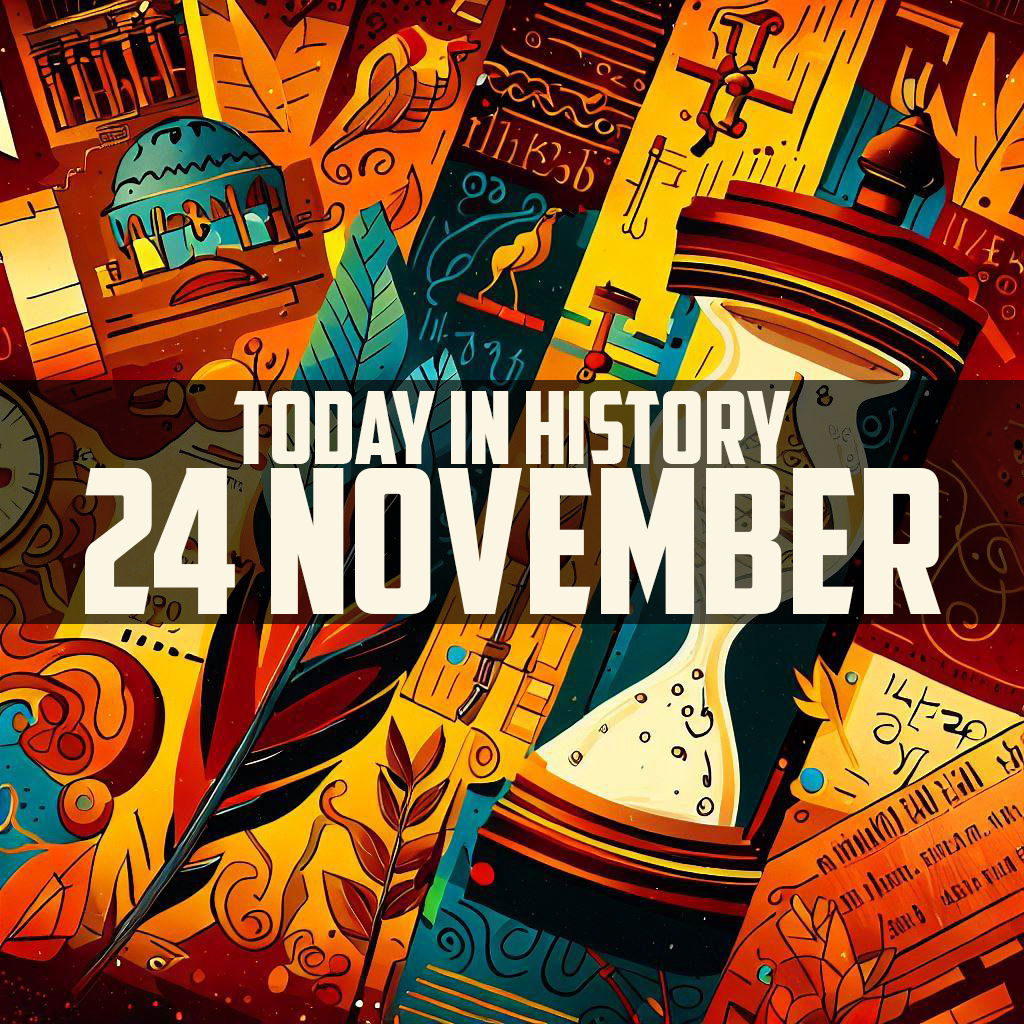24 November holds a treasure trove of significant events, from scientific achievements to political milestones, and cultural phenomena that have shaped the world’s history. As we journey through time, this date provides a mirror into our collective past, illuminating the ever-evolving human narrative.
Today in History: 24 November

1. 1859: Publication of “On the Origin of Species”
Charles Darwin’s seminal work, “On the Origin of Species by Means of Natural Selection,” was published on this day. It proposed the theory of evolution through natural selection, challenging contemporary beliefs about creation and the diversity of life. The book revolutionized biology, laying the foundation for modern evolutionary studies and sparking heated debates that continue to this day.
2. 1963: Lee Harvey Oswald Assassinated
Two days after being arrested for allegedly assassinating President John F. Kennedy, Lee Harvey Oswald was shot and killed by nightclub owner Jack Ruby while in police custody. Broadcast live on television, Oswald’s killing added further mystery and conspiracy theories to Kennedy’s assassination.
3. 1642: Abel Tasman Discovers Van Diemen’s Land (Tasmania)
The Dutch explorer Abel Tasman became the first European to reach the island of Van Diemen’s Land, now known as Tasmania. This exploration was instrumental in mapping the unknown southern parts of the globe and led to further European exploration and eventual colonization.
4. 1971: D.B. Cooper Hijacking
An unidentified man, who later became known as D.B. Cooper, hijacked a Boeing 727 aircraft, extorted a $200,000 ransom, and then parachuted away, disappearing without a trace. This event remains the only unsolved case of air piracy in the history of commercial aviation.
5. 1947: Red Scare: Hollywood Ten Blacklisted
Amid the growing paranoia of communism in the U.S., the House Un-American Activities Committee announced that the Hollywood Ten, a group of writers, directors, and producers, were in contempt of Congress for refusing to give testimony. This began a series of career-destroying blacklists for many in the entertainment industry, accused of having communist ties or sympathies.
6. 1991: Queen’s Freddie Mercury Announces He Has AIDS
Just one day before his death, Freddie Mercury, the lead vocalist of the band Queen, released a statement disclosing that he had been diagnosed with AIDS. His death brought worldwide attention to the HIV/AIDS epidemic and inspired the music industry to rally in support of research and patient care through tribute concerts and fundraisers.
7. 1850: The Storming of the State Apartments
While Queen Victoria was at home, ex-Army officer Robert Pate attacked her with a walking cane, marking the third time she was attacked publicly. Pate was later sent to the penal colonies in Australia for seven years for his crime.
8. 1922: Irish Author and Poet Erskine Childers Executed
Erskine Childers, a notable figure in the Irish Republican movement and author of the influential novel “The Riddle of the Sands,” was executed during the Irish Civil War for illegally possessing a gun, gifted to him by Michael Collins.
9. 1944: World War II – Bombing of Tokyo
The U.S. 73rd Bomb Wing launched the first bombing raid against Tokyo, using the B-29 Superfortress. This marked the beginning of a series of heavy bombings targeting Japan’s capital, culminating in the atomic bombings of Hiroshima and Nagasaki in 1945.
10. 1983: The Great Brink’s Robbery
In London, 6,800 gold bars worth nearly £26 million were stolen from the Brink’s-Mat vault at Heathrow Airport. The majority of the stolen gold has never been recovered, and the event remains one of Britain’s most notorious heists.
11. 1713: The “Old Pretender” Lands in Scotland
James Francis Edward Stuart, recognized by many Jacobites as James III of England and VIII of Scotland, made his unsuccessful attempt to reclaim the British throne. His landing marked the beginning of the First Jacobite Uprising.
12. 1962: The Cuban Missile Crisis Ends
Following intense negotiations, the Soviet Union agreed to remove its missiles from Cuba, marking the end of the Cuban Missile Crisis. This 13-day confrontation between the U.S. and the USSR is often regarded as the moment when the Cold War came closest to turning into a nuclear conflict.

Conclusion:
The 24th of November is a testament to the vast tapestry of events that have influenced the course of human history. From the pages of groundbreaking scientific literature to the dark corridors of political intrigue, from the realms of art and culture to the devastating realities of war, this day serves as a reminder of our shared history and the potential we have to shape the future. As we reflect on these events, we gain a deeper understanding of the complex interplay of forces that have brought us to the present moment.
